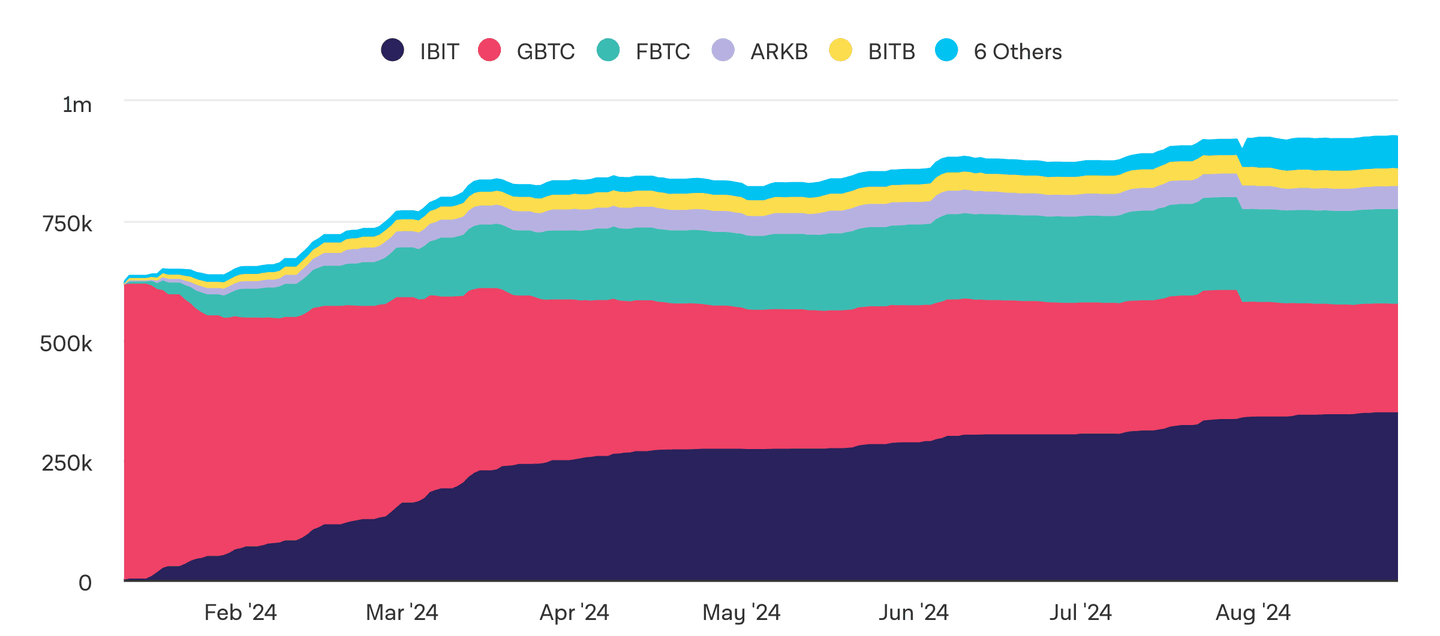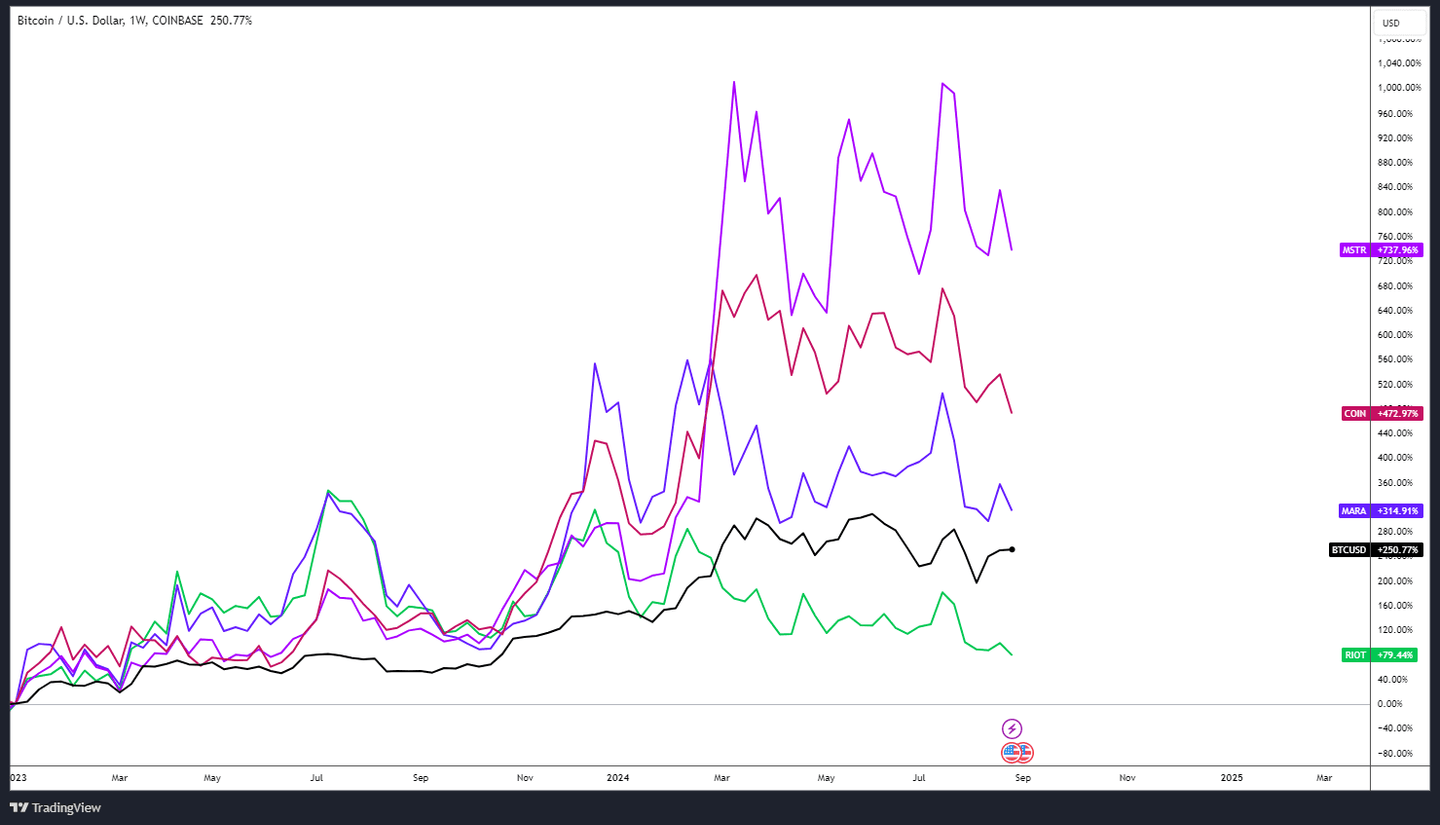Who Owns All the Bitcoins?

In the media: the German government and Mt. Gox
In recent months, there has been a lot of talk about the German government, Mt. Gox, and the sale of their bitcoin holdings.
The Federal Criminal Police Office (BKA) sold around 50'000 bitcoins in July 2024; the bitcoins were owned by the federal state of Saxony, which received them in the case of the arrest of the operator of the online streaming platform Movie2k. The state of Saxony is estimated to have made more than $2.9 billion from the sale of these bitcoins.
Also in July, the trustee of Mt. Gox announced that the company had begun repayments to creditors as part of the 2014 bankruptcy, repaying around 140'000 bitcoins ($8.96 billion at current prices) to affected customers.
Both events have led to considerable selling pressure on the Bitcoin market and many market participants have wondered which other countries, institutions, companies and private individuals still hold considerable amounts of bitcoin and could sell them, thus creating further selling pressure in the future.
Who owns the most bitcoins?
Not surprisingly, the largest Bitcoin holders are mainly exchanges and financial institutions that hold Bitcoin on behalf of their clients. Thus, the largest bitcoin holders, in order from first to fifth place, are Coinbase (≈850'000 BTC), followed by Binance (≈660'000 BTC), BlackRock (≈347'000 BTC), Fidelity Custody (≈289'000 BTC), and Grayscale (≈264'000 BTC). To put this into perspective, Coinbase holds around 5.4 percent of all BTC in free circulation, with a current total value of USD $54.4 billion. These are not the largest addresses per se, as some of these entities hold their bitcoins on multiple addresses. So far, so good, no big surprise, right?
Now let's take a look at the slightly more special “bitcoin whales”: In sixth place is MicroStrategy with ≈226'000 BTC, in seventh place is the US government with ≈203'000 BTC, in twelfth place is a Mt. Gox hacker with ≈79'000 BTC, and in 15th place is the first address that could not (yet) be assigned to anyone, it contains ≈78'000 BTC.
"Not your keys, not your coins…", right?
Despite the widespread credo “Not your keys, not your coins”, it is plausible that many exchanges and institutions, such as BlackRock and Fidelity, are among the largest holders of bitcoin. Many bitcoin owners do not yet seem to be in a position to be their own bank or simply have no interest in ever doing so. This is not too worrying, although the centralization of bitcoin holdings carries a certain risk and fundamentally contradicts Satoshi Nakamoto's original vision and idea, but this is a topic for another time...
Which companies own bitcoin?
How about companies? Which companies own the most bitcoin? As we already know, MicroStrategy, Michael Saylor's company, is at the top of the throne, for now. What does it look like below?

As we can see, there are no big surprises among the top 5 companies with the most bitcoins. Nevertheless, it is interesting to see that the crypto-native companies (Marathon Digital Holdings and Tether) are already outnumbered in the top 5 today. I wonder what this will look like in five or ten years’ time.
However, it should be noted that this list only includes companies that hold bitcoin directly on their balance sheets. Furthermore, it is difficult to find a reliable list of companies with bitcoin holdings. There is a wide variety of information floating around on the internet, even though it would be fundamentally easy to prove the holdings on the blockchain. As an example, various sites list the company Block.one (the developers behind the EOS blockchain) with over 160'000 BTC, but we were not able to find any trustworthy sources for this.
Bitcoin as a strategic reserve asset for nation-states?
Back to nation-states. As we now know, the US government holds more than 200'000 BTC and the German state of Saxony sold around 50'000 BTC just this summer of 2024. Are there any other countries that hold bitcoin? And how did the bitcoins come into their possession?
According to Arkham, in addition to the USA with 203'000 BTC, the UK and El Salvador also hold considerable amounts of Bitcoin. The UK currently holds 61'000 BTC, which it confiscated as part of an investigation into a Chinese financial fraud scheme. El Salvador is in possession of 5'800 BTC, which they have purchased over the last few years. Currently, the government of El Salvador buys an additional Bitcoin every day.
According to Arkham, these are the only actually confirmed bitcoin holdings of nation states. However, there are various national banks and sovereign wealth funds that have indirect exposure to Bitcoin, for example via share purchases of MicroStrategy or other crypto stocks, but more on this later. Additionally, the internet is rife with various other rumors, for example that the Chinese government holds over 195'000 BTC, which it is said to have confiscated in connection with the conviction of the PlusToken operators. Bulgaria is also said to have confiscated more than 230'000 BTC. However, there is no clear evidence for these rumors today.
El Salvador is therefore currently the only country that actually holds bitcoin, which they have also bought willingly. However, this could soon change if, for example, Donald Trump's statements at the Bitcoin Conference 2024 in Nashville are to be trusted. In Nashville, the former US president announced that, should he become president again, he would in fact make Bitcoin a strategic reserve currency of the United States. This could kick-start an interesting geopolitical dynamic if the US were to actually introduce Bitcoin as a reserve currency.
The Bitcoin spot ETFs
Since January 11, 2024, investors worldwide have enjoyed the opportunity to invest in Bitcoin via the infamous spot ETFs. The largest holders of BlackRock's Bitcoin Spot ETF (IBIT) include Millenium Management, the Goldman Sachs Group, Jane Street Group, Morgan Stanley and the State of Wisconsin Investment Board. The sheer amount of bitcoin held by the issuers of these Bitcoin spot ETFs on behalf of their clients is enormous. For example, BlackRock holds 347'000 BTC on behalf of their clients, Fidelity holds 289'000 BTC, Grayscale holds 264'000 BTC, and ARK Invest holds 44'900 BTC. In total, all Bitcoin spot ETFs currently hold almost 1 million bitcoins; BlackRock and Fidelity thus hold more than half of this amount, as illustrated in the chart below.

Interest in these new products is huge, and many investors are delighted with the price gains of the last 18 months. But is there a dark side to the story? Almost one million bitcoins (over 6 percent of all BTC in circulation) are already under the control of a few Wall Street financial giants. I wonder what Satoshi thinks of this.
Satoshi Nakamoto…, the Winklevoss Twins…, Michael Saylor…
Of course, there are also many private individuals with considerable Bitcoin treasures. Nothing is publicly known about most of them, but there are a few who are known to hold large amounts of bitcoin, although it is sometimes difficult to verify their holdings reliably.
Satoshi Nakamoto is said to be in control of numerous bitcoin wallets that cumulatively hold more than 1.1 million BTC. This makes Satoshi arguably the biggest “bitcoin whale” of all. However, Satoshi has not made a single transaction since 2010, and all of his bitcoins are untouched. We can therefore only speculate whether anyone has access to these BTC and what would happen if one day it turns out that someone does in fact have access to them.
The Winklevoss Twins, known for their feud with Mark Zuckerberg and their early investments in crypto companies, including Gemini, are said to be in possession of around 70'000 BTC. Tim Draper, a US investor, bought around 29'500 BTC in 2014 and is said to still own them. Michael Saylor is known firsthand to personally own around 17'000 BTC. The founder and former CEO of Binance, Changpeng Zhao (CZ), cannot be left out of this list, as he is one of the wealthiest and best-known crypto personalities, even if there is no concrete information on his bitcoin holdings.
All the entities mentioned so far have bought bitcoin directly, so they all hold bitcoin, partly in their own wallets and partly in custody with bitcoin custody providers. However, as already mentioned, investors also have the opportunity to profit from the Bitcoin price trend without having to buy bitcoin directly. For example, futures ETFs for bitcoin have been available for several years, and investors can also invest in shares of companies that are indirectly or directly related to bitcoin.
Indirect investments in bitcoin
In the following section, we will take a closer look at the possibility of indirect bitcoin investments on the stock market. The most prominent crypto stocks are currently Coinbase (COIN), MicroStrategy (MSTR), Marathon Digital Holdings (MARA) and Riot Platforms (RIOT). Bitcoin had also been a strong driver behind the price performance of Nvidia (NVDA) for quite some time. Block (SQ) and PayPal (PYPL) can be categorized as two other crypto stocks. All of these companies are multi-billion-dollar corporations with market capitalizations ranging from $2 billion (RIOT) to $24 billion (MSTR) to $2.5 trillion (NVDA).
Among the largest shareholders of the four crypto stocks, Coinbase (COIN), MicroStrategy (MSTR), Marathon Digital Holdings (MARA) and Riot Platforms (RIOT), some of the same Wall Street financial giants appear again and again, including Vanguard, BlackRock, Morgan Stanley and State Street. The clients of these traditional financial giants are therefore also indirectly invested in bitcoin to a greater or lesser extent, with Vanguard clients holding $2 billion in MicroStrategy shares, $3.4 billion in Coinbase shares, $520 million in Marathon Digital Holdings shares, and $230 million in Riot Platforms shares. Interestingly, Vanguard was vocal in its opposition to the new Bitcoin spot ETFs in January of this year and does not offer its clients its own bitcoin product or a way to invest in bitcoin or crypto products offered by other providers.
A short detour: the price performance of bitcoin alternatives compared to bitcoin (BTC)
If you compare the price performance of Bitcoin with the aforementioned alternatives on the stock market, you can see that MSTR, COIN and MARA have performed significantly better than Bitcoin itself since January 2023. At the time of writing (August 28, 2024), MSTR has performed the best with +730 percent, COIN is in second place with +470 percent, followed by MARA with +310 percent, and Bitcoin itself is up 250 percent since the beginning of 2023, followed by RIOT in last place with +80 percent.

The Swiss National Bank and indirect exposure to bitcoin
You surely remember Luzius Meisser's speech at the Swiss National Bank's Annual General Assembly this spring. Luzius has been arguing for years that the Swiss National Bank should invest in bitcoin. Funnily enough, it is already doing so, albeit only indirectly and in relatively small amounts, but it currently holds around $10 million in MARA, $65 million in MSTR, and $5 million in RIOT. In addition, it holds around $100 million in Block (SQ), which, in our opinion, should not be seen exclusively as an investment in a crypto company.
This is an interesting development, especially when you consider that the Swiss National Bank increased its holdings of MSTR shares by 59% in the second quarter of this year compared to the first quarter.
What does the distribution of bitcoin look like?
The maximum number of bitcoins that will ever be in circulation is approximately 21 million. There are currently 19.7 million bitcoins in circulation, so the number still being mined is approximately 1.3 million BTC. Of the 19.7 million BTC in circulation, it is estimated that 3.5 to 4 million BTC are considered lost or unavailable. If we now calculate the percentage of the various bitcoin holdings in relation to the number of bitcoins actually in circulation, i.e., approximately 15.7 million bitcoins. We can see that Satoshi, for example, owns around 7 percent of all BTC in circulation, and the Bitcoin spot ETFs already own 6.4 percent of all available BTC after six months. MicroStrategy owns 1.4 percent of all bitcoins, Coinbase 5.4 percent, the US government 1.3 percent, and the Mt. Gox hacker 0.5 percent.
In comparison with the distribution of gold, Satoshi Nakamoto, the Bitcoin ETFs and Coinbase hold a relatively high proportion of all bitcoins, with the USA holding a comparatively high 3.8 percent of the world's total above-ground gold holdings, followed by Germany with 1.5 percent, and Italy, France, Russia and China each holding around 1 percent of the total above-ground gold holdings.
Since Satoshi's bitcoins are untouched, the holdings of Bitcoin ETFs are attributable to various issuers, and Coinbase also holds most bitcoins on behalf of its clients, the current concentration of bitcoins is no cause for concern. However, it is important to keep an eye on the holdings of Bitcoin ETFs, because if the number of bitcoins in spot ETFs continues to increase at the current rate, there could be a certain concentration risk in a few years' time.
An interesting comparison: Switzerland owns 0.5 percent of the total above-ground gold holdings, i.e., the same amount as the 0.5 percent of all bitcoins in circulation held by the Mt. Gox hacker.
An outlook
The emergence of Bitcoin spot ETFs this year has shaken up the world of Bitcoin. Spot ETF issuers already hold around 6.4 percent of all bitcoins in circulation. That is a considerable amount. The USA, the UK and El Salvador are currently the only nation states that hold a larger quantity of bitcoins; the USA holds around 1.3 percent of all bitcoins. It will be interesting to see how these ownership ratios of nation states develop in the coming years, especially if Donald Trump is re-elected President of the United States.
With the latest developments surrounding the German government and Mt. Gox, it is exciting to note that the price of bitcoin has been dragged down somewhat by speculators but is still holding above $60'000 and absorbing the actual selling relatively well. Investors are likely to keep a close eye on the activities surrounding the US government's bitcoins in the coming months, as well as the behavior of Michael Saylor and MicroStrategy; in both cases, a sale would likely have consequences for the market. We also think it is important to keep an eye on Satoshi’s wallets; if his 1.1 million bitcoins were to move one day, this would probably come as a surprise to many.
In conclusion, we can observe that Bitcoin has arrived in the traditional financial world, whether directly or indirectly, and that many financial giants are already involved with Bitcoin worldwide, even though the amounts at stake are still relatively small. The concentration does not seem problematic to us and yet it is interesting to observe who owns how many bitcoins and how this will presumably develop in the coming years.
